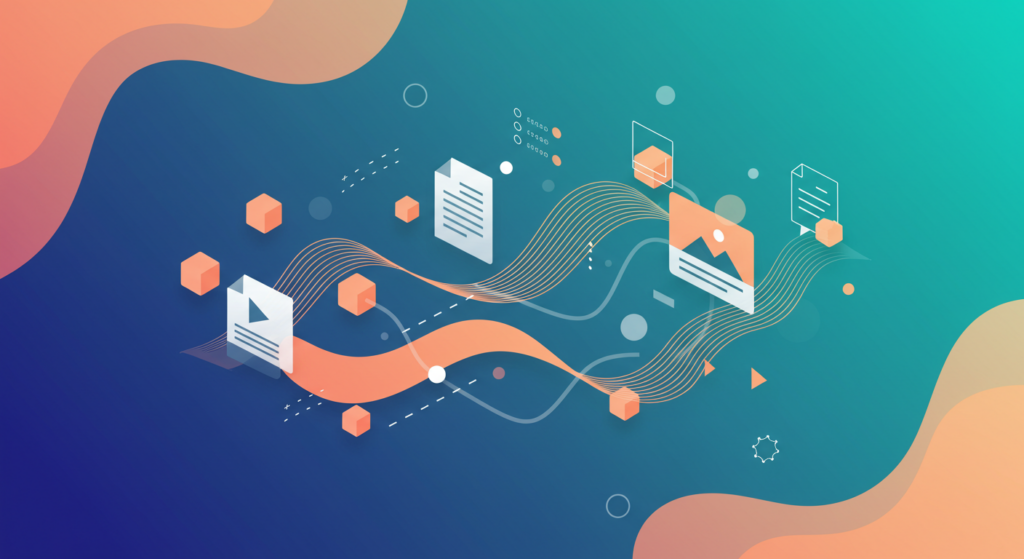The numbers don’t lie: the global AI agents market is projected to explode from $5.4 billion in 2024 to over $50 billion by 2030, representing a staggering 45% annual growth rate. But here’s what most marketing teams are missing: this isn’t just another tech trend to watch from the sidelines.
Marketing AI agents are fundamentally reshaping how content operations work, moving beyond the limitations of traditional automation to create intelligent, adaptive systems that actually think about what they’re doing. These aren’t your typical chatbots or simple workflow triggers. They’re sophisticated digital workers that can plan campaigns, optimize content quality, ensure compliance, and orchestrate complex AI-powered content workflows without constant human intervention.
The shift toward AI-powered content operations is a complete reimagining of how marketing teams create, manage, and deliver content at scale. For B2B organizations struggling with increasing content demands, fragmented workflows, and the need for personalized experiences across multiple channels, AI agents offer a path forward that’s both practical and transformational.
Understanding Marketing AI Agents: Beyond Simple Automation
Marketing AI agents represent a quantum leap beyond traditional marketing automation. While conventional tools follow rigid “if this, then that” logic, AI agents in marketing operate with genuine intelligence, adapting their behavior based on context, learning from outcomes, and making autonomous decisions that improve over time.
Traditional automation is efficient and predictable but limited to predetermined paths. Marketing AI agents, however, function more like experienced team members who understand your goals, recognize patterns, and adjust their approach based on changing circumstances.
These intelligent systems combine multiple AI technologies, including machine learning, natural language processing, computer vision, and predictive analytics, to create autonomous entities capable of handling complex, multi-step processes. According to IBM research, 99% of enterprise developers are now exploring or developing AI agents, signaling a massive shift in how businesses approach intelligent automation.
The key differentiators that separate AI agents from traditional automation include their ability to maintain context across interactions, learn from historical data and user feedback, make decisions in ambiguous situations, and coordinate with other systems and agents to achieve complex objectives. They can handle nuanced tasks that previously required human judgment, like determining the optimal content mix for a specific audience segment or identifying potential compliance issues before they become problems.
For marketing teams, these systems actually contribute strategic value by anticipating needs, identifying opportunities, and optimizing performance in real-time.
The Content Operations Revolution: How AI Agents Transform Workflows
Traditional content operations often resemble a game of telephone played across multiple departments, tools, and time zones. Content requests get lost in email threads, assets live in scattered repositories, approval processes create bottlenecks, and teams spend more time searching for existing content than creating new experiences.
AI agents in marketing restructure these workflows by introducing intelligent orchestration that adapts to real-world complexity. Instead of rigid approval chains that break when someone’s out of office, AI agents can dynamically route content based on urgency, complexity, and available resources. Rather than manual metadata tagging that’s inconsistent and time-consuming, intelligent systems automatically enrich assets with relevant information that makes them discoverable and reusable.
The transformation is particularly dramatic in how teams handle content planning and execution. Traditional approaches require extensive upfront mapping of every possible scenario, creating brittle systems that fail when reality doesn’t match the predetermined workflow. AI-powered content workflow systems, by contrast, operate more like experienced project managers who understand the end goal and can navigate obstacles, prioritize tasks, and dynamically coordinate resources.

5 Ways AI Agents Transform Content Operations
1. Intelligent Workflow Orchestration: AI agents eliminate the rigid, linear workflows that create bottlenecks in traditional content operations. They dynamically route tasks based on workload, expertise, and priority, ensuring content moves through production pipelines efficiently even when circumstances change.
2. Predictive Content Planning: By analyzing historical performance data, market trends, and audience behavior, AI agents can anticipate content needs and proactively suggest campaign strategies. This shift from reactive to predictive planning helps teams stay ahead of demand rather than constantly playing catch-up.
3. Automated Quality Assurance: Content automation extends beyond creation to include intelligent quality checks. AI agents can analyze content for brand consistency, regulatory compliance, tone alignment, and performance optimization, catching issues before they reach audiences and reducing the review cycles that slow down launches.
4. Dynamic Asset Optimization: Rather than creating static content that remains unchanged across channels, AI agents can automatically generate variants optimized for different platforms, audiences, and contexts while maintaining brand consistency and message integrity.
5. Real-Time Performance Optimization: AI agents continuously monitor content performance across channels, automatically adjusting distribution strategies, identifying opportunities for repurposing high-performing assets, and flagging content that needs refresh or retirement.
Intelligent content automation enables entirely new approaches to content lifecycle management that would be impossible with traditional tools and manual workflows.
Types of AI Agents Reshaping Marketing Content Operations
Marketing AI agents encompass specialized systems designed to handle specific aspects of the content operations lifecycle. Understanding these different types helps marketing teams identify where intelligent automation can deliver the greatest impact.
Planning and Strategy Agents function as digital strategists, analyzing campaign objectives, audience data, and performance history to generate comprehensive briefs and content strategies. These systems can break down complex campaigns into executable components, suggest optimal content mixes, and adapt strategies based on real-time market conditions. They can consider factors like seasonal trends, competitive landscapes, and resource constraints when developing recommendations.
Production and Creation Agents handle the heavy lifting of content generation and adaptation. Beyond simple text generation, these systems can automatically resize images for different platforms, generate video variants for various social channels, translate content while maintaining brand voice, and create personalized versions of campaigns for different audience segments. The AI revolution in content creation has made it possible to scale creative production in ways that were previously cost-prohibitive.
Quality and Compliance Agents serve as intelligent gatekeepers, automatically scanning content for brand guideline adherence, regulatory compliance requirements, and potential legal issues. These systems can flag problematic content before it enters approval workflows, suggest corrections that maintain creative integrity, and ensure consistent application of brand standards across global teams and external agencies.
Analytics and Performance Agents continuously monitor content effectiveness across channels, providing insights that go beyond traditional metrics. These systems can identify patterns in audience engagement, predict which content types will perform best for specific campaigns, and automatically optimize distribution strategies based on real-time performance data.
The power multiplier effect occurs when these different agent types work together, creating integrated systems that can handle end-to-end content operations with minimal human intervention. This coordination enables content intelligence that was previously impossible with disconnected tools and manual processes.
Measuring the Impact: ROI and Performance Metrics
The business case for marketing AI agents becomes clear when examining the quantifiable improvements organizations achieve across key performance indicators. According to Salesforce research, companies implementing AI agents report dramatic efficiency gains, with sales teams seeing revenue growth rates of 83% compared to 66% for teams without AI.

Efficiency and Time Savings represent the most immediately visible benefits. Organizations implementing intelligent content automation report saving 10-20 hours per week across content operations workflows, allowing teams to redirect effort toward strategic initiatives rather than repetitive tasks. These time savings compound across the organization, freeing creative teams to focus on high-value work that drives business outcomes.
Content Quality and Consistency improvements manifest through reduced revision cycles, fewer compliance issues, and more consistent brand application across channels. Teams report significant reductions in the back-and-forth typically required to get content from concept to publication, with AI agents catching issues early in the process rather than during final reviews.
Speed-to-Market Acceleration becomes particularly important in competitive markets where timing can determine campaign success. Organizations using AI agents can respond to market opportunities more quickly, launch campaigns in response to trending topics, and adapt messaging based on real-time feedback without the delays inherent in traditional approval processes.
Cost Reduction Through Automation extends beyond labor savings to include reduced technology overhead, fewer compliance penalties, and more efficient resource utilization. Teams can accomplish more with existing headcount while reducing the need for expensive external agencies or additional software licenses.
The MarTech research indicates that organizations are moving beyond experimental implementations to measure concrete ROI, with 2025 expected to be the year when AI agents must prove their business value through measurable improvements in core metrics.
Implementation Considerations for B2B Marketing Teams
Successfully deploying marketing AI agents demands thoughtful change management, clear success metrics, and realistic expectations about the transformation timeline.
Assessing Organizational Readiness starts with an honest evaluation of current content operations maturity. Teams with well-documented workflows, centralized asset management, and clear governance structures typically see faster AI agent adoption success than organizations with fragmented processes and scattered content repositories. Getting started with AI in content marketing requires establishing these foundational elements before adding intelligent automation layers.
Integration Challenges and Solutions often center around connecting AI agents with existing martech stacks and ensuring data flows seamlessly between systems. The most successful implementations take a modular approach, starting with specific use cases where AI agents can deliver immediate value while building toward more comprehensive automation over time.
Change Management for Teams becomes critical as AI agents take over tasks that humans previously handled manually. Clear communication about how roles will evolve, what new skills teams need to develop, and how AI agents will augment rather than replace human creativity helps smooth the transition and build buy-in across the organization.
Measuring Success and ROI requires establishing baseline metrics before implementation and tracking improvements across multiple dimensions, such as efficiency, quality, speed, and strategic impact. Organizations that define success criteria upfront and regularly assess progress against these benchmarks typically achieve better outcomes than those that implement AI agents without clear measurement frameworks.
The Future of AI Agents in Content Operations
The trajectory for AI agents in marketing points toward increasingly sophisticated systems that can handle complex, strategic tasks that currently require human oversight. Industry predictions suggest we’ll see AI agents capable of conducting market research, developing comprehensive campaign strategies, and negotiating with external vendors for content production resources.

Multi-agent systems will become the norm, with specialized AI agents collaborating to handle end-to-end content operations. These agent ecosystems will coordinate tasks across planning, creation, optimization, and measurement, creating truly autonomous content operations that adapt to changing market conditions without human intervention.
The integration of AI agents with emerging technologies like augmented reality, voice interfaces, and IoT devices will expand their capabilities beyond traditional content formats, enabling the creation and optimization of immersive experiences that respond to real-time user behavior and environmental context.
Perhaps most impressively, AI agents will handle strategic decision-making, contributing genuine value through predictive insights, competitive analysis, and opportunity identification that informs broader marketing strategies.
The New Reality: AI Agents as Strategic Business Partners
Marketing AI agents are the foundation of a shift toward intelligent, adaptive content operations that can scale with business growth while maintaining quality and consistency. Organizations that embrace this technology now position themselves for competitive advantages that compound over time.
The transformation isn’t just about efficiency gains, though those are substantial. It’s about enabling marketing teams to focus on strategic work, creative problem-solving, and relationship building while AI agents handle the operational complexity that previously consumed so much time and energy.
Explore how intelligent content operations can transform your marketing outcomes. Aprimo’s AI agents provide enterprise-grade solutions for planning, creation, governance, and optimization that are already delivering measurable results for global brands. Get started with a personalized demo today.
FAQ
What’s the difference between AI agents and traditional automation? Traditional automation follows rigid, predetermined rules and workflows. AI agents use machine learning and contextual understanding to make autonomous decisions, adapt to changing circumstances, and learn from outcomes to improve performance over time. The result is an AI-powered content workflow that scales with your organization.
How do AI agents improve content operations efficiency? AI agents eliminate bottlenecks by dynamically routing tasks, automatically enriching content with metadata, conducting intelligent quality checks, and optimizing content performance in real time, reducing manual work while improving consistency and speed.What should companies consider before implementing AI agents? Organizations should assess their current content operations maturity, ensure they have centralized asset management and clear governance structures, plan for change management and team training, and establish clear success metrics before implementation.


